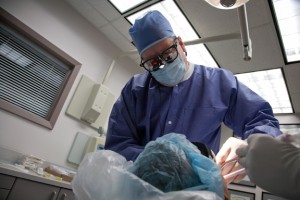I had an interesting experience yesterday. A former patient from years ago came to see me. As sometimes happens she did not stay the course and slipped on making sure she was seeing dentists regularly. Now over five years later she returns with one of her upper central incisors slowly avulsing. She knows it needs to come out. She has known this for some time now. But finally she has the courage to come back and see me.
She came with a referral slip from a dental clinic nearby. I was in this facility earlier this month. It is owned by someone in another state and according to “the rules” I was not able to go back to the treatment area, which means that the dentists who work there are blocked from consultations with their patients and outside specialists chairside. Interesting…
OK, fine. Now back to this particular patient. Her primary concern would be what?
To make sure that when she loses the tooth, which will likely come out in the impression, that there is a replacement right away.
There are two options to accomplish this. First the extracted tooth or an artificial tooth can be bonded back in. Secondly, a treatment partial can be fabricated within a day and delivered to the patient. I went back to this office and explained the issue, actually giving them the opportunity to make money today. According to “the rules,” however, they can only work with a particular lab out of state and the turn-around time is two weeks. The patient is horrified with this prospect.
So I will take care of it myself and use a local lab. Once we are past this immediate concern I will then move on to the comprehensive periodontal evaluation and the rest.
How sad to lack the flexibility to provide the care patients want and actually need.
How sad to be locked into rules that separate dentists from outside support.
How fortunate for those dentists who have the ability to provide Nordstrom-level service crafting care to specific needs of specific people with unique concerns and problems.
Apparently we are moving into a future with two entirely different dentistry business models. This isn’t really new, but I sense it is accelerating and shifting, becoming even more apparent to patients. Right now if you ask most adults, they believe that all dentists are more or less the same. This is evidence that most of the population respects the dental profession and considers most of its members competent.
The model I subscribe to, and believe I was taught in dental school, is people-centered. I believe that public trust today is based on the performance in the past of this particular model. The competing idea is an economic efficiency model where it appears, not only patients become objects, but dentists and the rest of the team as well. “What will the insurance cover?” seems to be the driver, but here is the risk to the dentists who go along. Who is responsible when conditions deteriorate? Who will the unhappy patients go after? The business people? Nope. They’re covered by contractual clauses and simply say, “We aren’t the doctor.”
Now don’t misunderstand me. I’m not opposed to group practices or even business models that focus on particular economic segments of the population. In fact, I am all for them. But regardless the number of dentists in the office, or who owns what, I believe dentists must be leaders where they work and continue to make decisions that improve patients’ lives. Period.
Certainly both models will continue to exist on into the future, but I predict this. The people-centered model will last and grow. The low-end insurance or business school-driven will fail over and over because it isn’t really interested in creating patient loyalty. This doesn’t mean these patients will eventually end up in people-centered practices. More likely they will move between all the corporate start-ups that don’t understand what creates return business. And in the meantime, what about the people? Not just the patients, but also the dentists and their teams? High pressure to meet economic goals as the fundamental reason for work within any health care setting robs workers of their hearts of service. Without this, they easily burn out because they can no longer be proud of what they do for a living.
And what ultimately happens to the profession? Will dentistry remain as highly respected as it is today? Should it?

